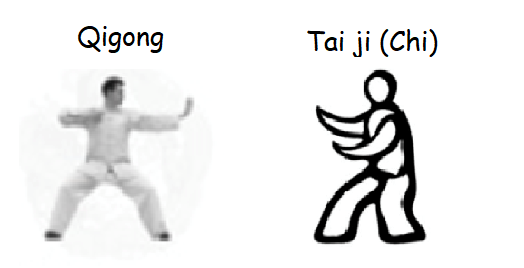Questions I have been asked quite frequently are: What is the difference between Qigong and Tai Ji? Which class should I take?
The first question is first. Both Tai Ji and Qigong are ancient practices that can improve health, fitness, well-being, and longevity. Both cultivate the “Qi” (or “life energy”) that flows through the body’s meridians by combining movement, breathing, and meditation.
Qigong literally means “life energy work”. It is a healing art, a way of cultivating physical, spiritual, and psychical health, that originated in China about seven thousand years ago. As part of Traditional Chinese Medicine, Qigong can be practiced as a physical movement that incorporates deep breathing or as stationary meditation.
Qigong Forms are not nearly as intricate as Tai Ji forms, which need not be executed as precisely. So anyone in any health condition can learn Qigong quickly by simply following the instructor’s movements.
Tai Ji is a martial art and healing art that originated in China more than two thousand years ago. The Tai Ji forms are more complicated and take considerably longer to learn because the movements in a Tai Ji form follow certain rules and involve intricate body mechanics. Done correctly, it stimulates the energy and power flow through different meridians, freeing up blocked pathways and allowing the Qi to flow throughout the body more effectively.
Qigong and Tai JI, which class is better for you?
Practicing Tai Ji and Qigong regularly offers similar health benefits. To decide which class to take, here are some factors you may want to consider. If you have physical difficulties, the Qigong class fits you better. If you are new to Tai Ji, start from the Qigong class, and switching to Tai Ji could make your learning curve smoother. If you have been learning Tai Ji for a while, taking some Qigong classes could help you learn Tai Ji better because, in Qigong class, you will learn a variety of Qigong forms that can help you to be more physically fit and enable you to perform some tricky movements in Tai Ji with relative ease.

Thanks for posting. I really enjoyed reading it, especially because it addressed my problem. http://www.hairstylesvip.com It helped me a lot and I hope it will help others too.
Your writing possesses the rare ability to simplify complex ideas without losing their depth — truly remarkable.